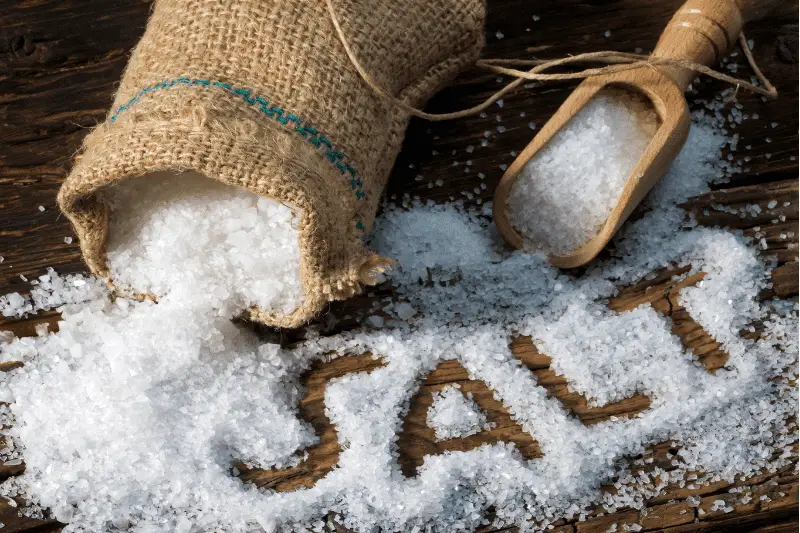Preserving fresh produce can be a challenge, especially if you have excess fruits and vegetables from your garden or local farmers’ market.
One traditional method that has stood the test of time is salt brine pickling.
Not only does it extend the shelf life of produce, but it also provides numerous health benefits. In this blog post, we will explore the process of traditional salt brine pickling and its advantages over other preservation methods.

What is Salt Brine Pickling?
Salt brine pickling is a method of preserving food through fermentation using a solution of water and salt known as a brine.
The process involves immersing vegetables in the brine for several days to allow natural bacteria to ferment them slowly while preventing harmful bacteria from thriving.
Compared to vinegar-based pickling, salt-brined pickles have a more complex flavor profile due to the fermentation process that produces lactic acid.
Salt-brined pickles are also known as fermented pickles and have a long shelf-life of up to two years.
Advantages of Salt Brine Pickling:
– Retains original nutritional value and flavor
– Enhances nutritional content by increasing probiotics
– Does not require heat processing like canning
How to Make Salt Brine Pickles
To make salt-brined pickles at home, you need fresh vegetables (cucumbers work well), water, non-iodized table salt or pickling salt, jars with lids, and fermentation weights.
Step-by-step guide:
1) Dissolve 2 tablespoons of salt in 4 cups of water (1 quart)
2) Pack cleaned vegetables into jars with spices such as dill seeds or garlic cloves
3) Pour the brine over the vegetables until they are fully submerged.
4) Add a fermentation weight on top of the veggies to prevent them from floating above the surface.
5) Seal the jar with a fermentation lid.
6) Place the jar in a cool, dark location, and wait for the fermentation process to take place.
It is crucial to ensure that all vegetables are fully submerged and that there is adequate salt content. Insufficient salt can lead to spoilage or harmful bacterial growth.
The Fermentation Process
In salt brine pickling, fermentation plays a crucial role in preserving food by creating lactic acid.
The bacteria present on the surface of vegetables turn sugar into lactic acid during fermentation, causing them to sour over time.
The optimal fermentation period depends on your personal preference for sourness level.
However, typically it takes about 2 days to notice bubbles forming and up to 14 days for the desired acidity.
The Shelf Life of Salt Brine Pickles
The longevity of fermented pickles is unmatched compared to other preservation methods like canning or freezing.
As long as the storage container is well-maintained and not contaminated, salt-brined pickles can last up to two years.
Factors that affect longevity include proper submersion of all vegetables in the brine solution, adequate salt content, use of clean containers and utensils throughout the process, and proper storage temperature.
Storing Salt Brine Pickles
Salt-brined pickles are best stored in a refrigerator below 40°F; however, storing them at room temperature may also be an option if you consume them within six months.
Proper container care includes using glass jars with tight-fitting lids that keep out air while allowing gases produced during fermentation to escape through a fermentation lid.
Avoiding contamination involves washing your hands before handling jars or ingredients and ensuring all equipment used throughout the process is clean and sterilized properly.
Enjoying Your Homemade Pickles
Fermented pickles offer versatility in how they can be enjoyed; sliced in sandwiches, added as toppings on salads or burgers, or consumed straight out of the jar.
Creative serving suggestions include:
– Adding sliced pickles to cocktails or as a garnish
– Using pickle juice as a marinade for meats or vegetables
– Chopping up pickles and adding them to dips or spreads like hummus
Fermenting vegetables through salt brine pickling is an excellent and easy method for preserving fresh produce.
Traditional salt brine pickling provides numerous benefits, including extending shelf life, enhancing nutritional content, and creating complex flavors.
Remember to maintain proper submersion of vegetables in the brine solution, adequate salt content, clean equipment, and storage containers to ensure longevity.
So go ahead! Try your hand at salt brine pickling today!
